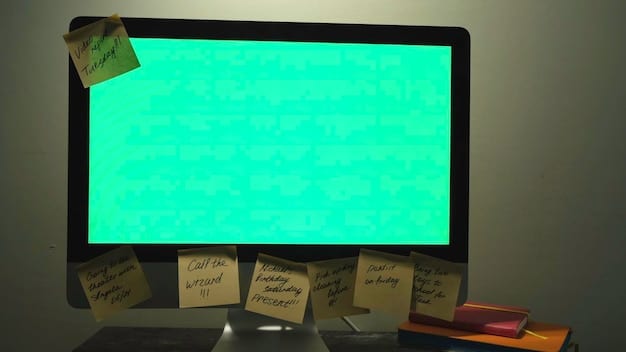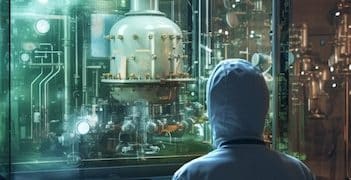AI-Generated Scripts: Will They Ruin US Movie Quality in 6 Months?

The rise of AI-generated scripts presents a significant, uncertain impact on the quality of US movies in the next six months, raising questions about originality, artistic merit, and the role of human creativity in filmmaking.
The film industry is on the cusp of a significant shift. The question looming over Hollywood is: How Will the Rise of AI-Generated Scripts Affect the Quality of US Movies in the Next 6 Months? This emerging technology promises efficiency and innovation, but at what cost to the artistic integrity of American cinema?
The Dawn of AI Screenwriting in Hollywood
Artificial intelligence is no longer a futuristic fantasy; it’s a present-day tool rapidly finding its way into various creative fields, including screenwriting. In Hollywood, the allure of AI lies in its potential to expedite the script development process, analyze audience preferences, and even generate entirely new storylines. But what does this mean for the stories we see on the big screen?
The integration of AI in screenwriting brings both opportunities and challenges. On one hand, AI can assist writers in overcoming creative blocks, identifying market trends, and streamlining the production pipeline. On the other hand, the reliance on algorithms raises concerns about the homogenization of narratives, the loss of authentic voices, and the overall quality of cinematic storytelling.

The influence of AI on US movies in the next six months hinges on how these scripts are used and regulated. Will AI serve as a collaborative tool that enhances human creativity, or will it become a substitute for the unique perspectives and emotional depth that human writers bring to their work?
The Promises of AI-Assisted Screenwriting
AI tools offer screenwriters a range of potential benefits, from generating story ideas to analyzing script performance.
- Faster Turnaround Times: AI can analyze vast amounts of data and generate script drafts much faster than a human writer.
- Cost Efficiency: Reducing the time spent on script development can lead to significant cost savings for production companies.
- Data-Driven Decisions: AI can identify popular themes, character archetypes, and plot structures that resonate with target audiences.
The Perils of Over-Reliance on AI in Scripting
While AI offers many advantages, blindly trusting algorithms to write scripts poses several risks.
- Lack of Originality: AI-generated scripts may rely too heavily on existing formulas, leading to predictable and uninspired stories.
- Loss of Emotional Depth: AI may struggle to capture the nuances of human emotion and create characters that audiences can truly connect with.
- Ethical Considerations: Questions arise about copyright, authorship, and the potential for AI to perpetuate biases present in its training data.
In conclusion, the rise of AI screenwriting presents a double-edged sword. While it promises efficiency and data-driven insights, it also raises concerns about originality, emotional depth, and ethical considerations in the creation of US movies.
How AI is Currently Being Used in Screenwriting
To understand the potential impact of AI on US movies in the next six months, it’s crucial to examine how AI is currently being utilized in screenwriting. The applications range from basic script analysis tools to sophisticated AI models capable of generating complete screenplays.
Many screenwriters are already using AI-powered software to analyze their scripts, identify plot holes, and improve dialogue. These tools provide valuable feedback and can help writers refine their work. However, the more ambitious use of AI involves generating entire scenes or even full-length scripts.
Several companies are developing AI models that can generate original storylines, character descriptions, and dialogue based on user prompts. While these models are still in their early stages, they are rapidly improving and could potentially revolutionize the way movies are made.

AI Tools for Script Analysis
These tools are designed to help screenwriters improve their existing scripts.
- Plot Hole Detection: AI algorithms can analyze a script for inconsistencies and gaps in the narrative.
- Dialogue Enhancement: AI can suggest alternative dialogue options that are more natural-sounding or engaging.
- Character Development Feedback: AI can assess the consistency and believability of character arcs.
AI Models for Script Generation
These models are capable of creating original scripts from scratch.
- Storyline Generation: AI can generate plot ideas based on genre, theme, and target audience preferences.
- Character Creation: AI can create character profiles, including backstories, motivations, and relationships.
- Dialogue Writing: AI can write dialogue that is tailored to specific characters and situations.
In conclusion, AI is currently being used in screenwriting in two primary ways: as a tool for script analysis and as a model for script generation. The extent to which these applications will impact the quality of US movies in the next six months remains to be seen, but their influence is undeniable.
The Potential Upsides: Enhancing Creativity and Efficiency
While the integration of AI in screenwriting raises concerns, it also presents several potential upsides. AI could become a valuable tool for enhancing creativity, improving efficiency, and democratizing the filmmaking process.
One of the most promising benefits of AI is its ability to help writers overcome creative blocks. By generating new ideas and suggesting alternative approaches, AI can spark inspiration and lead to more innovative storytelling. AI can also streamline the script development process, allowing writers to focus on the more creative aspects of their work.
AI could also democratize filmmaking by making scriptwriting more accessible to aspiring writers who lack formal training. AI-powered tools can provide guidance and feedback, helping new writers develop their skills and bring their stories to life.
AI as a Muse: Overcoming Writer’s Block
AI can help writers generate new ideas when they are feeling stuck.
By providing a constant stream of suggestions and possibilities, AI can help writers break out of their comfort zones and explore new creative territory. This can lead to more original and engaging stories that would not have been possible without AI assistance.
AI as a Time-Saver: Streamlining the Writing Process
AI can automate many of the tedious tasks involved in scriptwriting.
This can free up writers to focus on the more creative and rewarding aspects of their work, such as character development, plot construction, and dialogue writing. By streamlining the writing process, AI can help writers produce higher-quality scripts in less time.
In conclusion, the incorporation of AI has the potential to enhance creativity, improve efficiency, and democratize the filmaking process.
The Potential Downsides: Homogenization and Loss of Authenticity
Despite the potential benefits, the rise of AI-generated scripts also raises significant concerns about the quality of US movies. The biggest risks revolve around homogenization of narratives and the loss of authentic voices in filmmaking.
AI algorithms are trained on vast datasets of existing movies and TV shows. This means that AI-generated scripts are likely to repeat familiar tropes, character archetypes, and plot structures. If AI becomes too dominant in screenwriting, it could lead to a decline in originality and diversity in American cinema.
AI may also struggle to capture the nuances of human emotion and experience. Authentic storytelling often comes from personal experiences, cultural perspectives, and unique worldviews. If AI replaces human writers, it could lead to a loss of emotional depth and cultural richness in movies.
The Risk of Formulaic Storytelling
AI-generated scripts may rely too heavily on established formulas.
This could lead to predictable and uninspired stories that lack the originality and creativity that moviegoers crave. The reliance on algorithms could stifle innovation and lead to a decline in the overall quality of cinematic storytelling.
The Loss of Human Emotion and Perspective
AI may struggle to capture the complexities of human emotion.
Authentic storytelling requires a deep understanding of human psychology, empathy, and the ability to convey emotions in a way that resonates with audiences. If AI replaces human writers, it could lead to a loss of emotional depth and the ability to connect with viewers on a personal level.
To summarize, the homogenization and loss of authenticity are two potential downfalls that can occur through the rise of AI-generated scripts, which can then ultimately affect the creative quality of US movies.
Will AI-Generated Scripts Lead to Lower Quality Movies?
The ultimate question is whether the rise of AI-generated scripts will lead to a decline in the quality of US movies. While it’s impossible to predict the future with certainty, we can assess the potential impact based on current trends and the capabilities of AI technology.
If AI is used primarily as a tool to assist human writers, it could potentially improve the quality of movies by streamlining the writing process and helping writers overcome creative challenges. However, if AI becomes a substitute for human writers, it could lead to a decline in originality, emotional depth, and cultural richness.
The key will be finding a balance between leveraging the benefits of AI and preserving the unique contributions of human creativity. The film industry will need to develop ethical guidelines and best practices for using AI in screenwriting to ensure that it enhances rather than diminishes the quality of US movies.
- The Role of Human Oversight: Human writers and editors will need to carefully review and revise AI-generated scripts to ensure they meet artistic and ethical standards.
- The Importance of Original Ideas: The film industry will need to prioritize originality and innovation to prevent AI from leading to formulaic storytelling.
- The Value of Diverse Voices: The industry must ensure that AI does not perpetuate biases and that diverse voices continue to be heard in American cinema.
In conclusion, AI-generated scripts will only lead to lower quality movies if creativity, origianlity and diversity is lost from storytelling. If these core components of movie making are still kept alive, AI can be a beneficial tool.
The Future of Screenwriting: Collaboration or Replacement?
The trajectory of AI in screenwriting hinges on how it is integrated into the creative process. Will it be a collaborative tool that enhances human creativity, or will it become a replacement for human writers? The answer to this question will determine the future of screenwriting and the quality of US movies.
A collaborative approach would involve AI assisting writers with tasks such as generating ideas, analyzing scripts, and streamlining the writing process. Human writers would still be responsible for crafting the core story, developing characters, and writing dialogue. In this scenario, AI could help writers become more efficient and creative, leading to higher-quality movies.
A replacement approach would involve AI generating entire scripts with minimal human input. While this could potentially save time and money, it also carries the risk of homogenization and the loss of authentic voices. In this scenario, the quality of US movies could decline as AI-generated scripts become increasingly formulaic and uninspired.
The Collaborative Model: AI as a Creative Partner
AI assists writers with specific tasks while humans retain creative control.
- Brainstorming: AI generates ideas; writers select and develop them.
- Script Analysis: AI identifies issues; writers revise and improve.
- Dialogue Polish: AI suggests improvements; writers refine the final product.
The Replacement Model: AI as the Sole Author
AI generates entire scripts with minimal human input.
- Full Script Generation: AI creates complete screenplays from scratch.
- Automated Revisions: AI automatically revises scripts based on feedback.
- Lack of Human Oversight: Minimal human involvement in the writing process.
In conclusion, the answer to whether AI is integrated into the creative process will determine the type of outcome that will ensue, and also the quality of movie making.
What Can Be Done to Ensure AI Enhances, Not Hurts, Movie Quality?
To ensure that AI enhances rather than harms the quality of US movies, several steps can be taken. The film industry, writers, and policymakers all have a role to play in shaping the future of AI in screenwriting.
The film industry should develop ethical guidelines and best practices for using AI in screenwriting. These guidelines should prioritize originality, creativity, and diversity. They should also ensure that human writers retain creative control over the writing process.
Writers should embrace AI as a tool but not as a replacement for their own creativity. They should use AI to assist with specific tasks but should always bring their own unique perspectives and emotional depth to their work.
Policymakers should consider the legal and ethical implications of AI in screenwriting. They should ensure that copyright laws protect the rights of human writers and prevent AI from being used to create derivative works without permission.
- Ethical Guidelines: Develop industry-wide standards for responsible AI use.
- Writer Education: Train writers on how to effectively use AI tools.
- Policy and Regulations: Create laws to protect the rights of human writers and prevent copyright infringement.
To summarize, in order to ensure AI enhances movie quality instead of hindering it, ethical guidelines, writer education and appropriate policy regulation are crucial.
| Key Point | Brief Description |
|---|---|
| 🤖 AI in Screenwriting | Promises efficiency but threatens originality in movies. |
| 🎭 Emotional Depth | AI may struggle to capture human emotion authentically. |
| 🎬 Collaborative Use | AI as a tool for writers can enhance creativity if balanced. |
| ✍️ Ethical Guidelines | Essential for responsible AI use in the film industry. |
FAQ
AI assists with script analysis, identifying plot holes and suggesting dialogue improvements. It’s also used to generate story ideas and even create full script drafts, enhancing efficiency in script development.
Over-reliance on AI can lead to a lack of originality, formulaic storylines, and a loss of emotional depth. Ethical concerns also arise, including copyright and bias issues in the AI’s training data.
Yes, AI can generate story ideas and suggest creative approaches, helping writers break through creative barriers. This allows writers to explore new territories and develop more unique stories.
Ethical guidelines, writer education, and policy regulations are essential. Prioritizing originality, diversity, and human oversight ensures AI augments rather than dominates cinematic storytelling.
There is a risk, as AI algorithms tend to repeat familiar tropes from existing movies. Careful management and ethical adoption are crucial to maintain originality and prevent formulaic storytelling in cinema.
Conclusion
In conclusion, the rise of AI-generated scripts presents both opportunities and threats to the quality of US movies. By embracing a collaborative approach, developing ethical guidelines, and prioritizing human creativity, the film industry can ensure that AI enhances rather than diminishes the art of filmmaking.

![The Director's Vision: Unveiling the Original Ending of [Show Title] The Director's Vision: Unveiling the Original Ending of [Show Title] - Cover Image](https://endingnew.com/wp-content/uploads/2025/06/endingnew.com_13_1749558874_76e67742_cover-360x180.jpg)
![Special Effects Secrets: Making [Movie Title] Magic for Under $50K Special Effects Secrets: Making [Movie Title] Magic for Under $50K - Cover Image](https://endingnew.com/wp-content/uploads/2025/06/endingnew.com_13_1749558769_a0223f59_cover-360x180.jpg)


